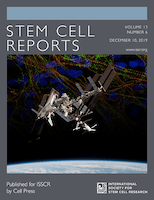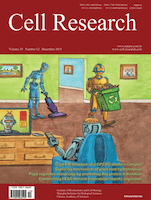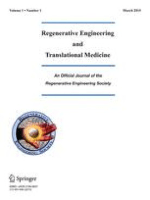
Stem Cell Reports
Scope & Guideline
Championing Open Access to Groundbreaking Research
Introduction
Aims and Scopes
- Stem Cell Biology and Dynamics:
The journal focuses on the fundamental biology of stem cells, including their self-renewal, differentiation, and the regulatory mechanisms involved. It often employs mathematical modeling and experimental techniques to elucidate these processes. - Innovative Therapeutic Applications:
There is a significant emphasis on translating stem cell research into clinical applications, particularly for regenerative medicine, including therapies for various diseases and conditions such as cardiac, orthopedic, and neurological disorders. - Interdisciplinary Approaches:
The journal promotes research that integrates various fields such as bioengineering, immunology, and computational biology to enhance the understanding and manipulation of stem cells for therapeutic purposes. - Ethical and Technical Frameworks:
Stem Cell Reports explores the ethical implications and technical advancements in fetal therapy and other stem cell applications, ensuring that research is conducted responsibly and with consideration for ethical standards. - Emerging Technologies in Stem Cell Research:
The journal highlights advancements in technologies such as 3D scaffolding, machine learning, and organoid development, which are pivotal in improving stem cell therapies and understanding their mechanisms.
Trending and Emerging
- Application of Machine Learning and Computational Modelling:
Recent papers emphasize the use of machine learning and quantitative modeling to analyze stem cell behavior and dynamics, reflecting a trend towards data-driven research methodologies that enhance predictive capabilities in stem cell applications. - Prenatal and Fetal Therapies:
There is a growing interest in prenatal therapies, particularly for congenital conditions, as evidenced by multiple recent publications. This trend underscores the potential of stem cell therapies to address developmental disorders early in life. - Immunomodulation and MSCs:
The immunomodulatory properties of mesenchymal stem cells (MSCs) are increasingly recognized, particularly in the context of treating inflammatory diseases and enhancing the efficacy of therapies, indicating a shift towards understanding immune interactions. - 3D Bioprinting and Scaffold Engineering:
Innovative approaches such as 3D bioprinting and engineered scaffolds are gaining prominence, showcasing their potential to optimize stem cell therapies and tissue engineering applications, further bridging the gap between basic research and clinical application. - COVID-19 Related Research:
The impact of the COVID-19 pandemic has led to a surge in research exploring the use of stem cells in treating related complications, particularly acute respiratory distress syndrome (ARDS), highlighting the adaptability of stem cell applications in response to global health challenges.
Declining or Waning
- Traditional Stem Cell Sources:
Research focusing exclusively on traditional stem cell sources, such as embryonic stem cells, has seen a decline in favor of more innovative approaches like induced pluripotent stem cells (iPSCs) and adult stem cells, which offer more ethical and practical advantages. - Basic Stem Cell Characterization Studies:
There is a noticeable decrease in papers solely dedicated to basic characterization of stem cells without direct application to therapeutic contexts. The trend is shifting towards studies that connect characterization with specific clinical applications. - Niche Microenvironment Studies:
While the role of stem cell microenvironments is crucial, there has been a waning interest in purely observational studies of niche interactions without integrating these findings into therapeutic strategies or technological advancements.
Similar Journals

Stem Cell Reviews and Reports
Transforming Understanding of Stem Cells and CancerStem Cell Reviews and Reports is a prestigious journal published by SPRINGER specializing in the dynamic field of stem cell research, encompassing various aspects of cell biology and cancer research. With an ISSN of 2629-3269 and E-ISSN of 2629-3277, this journal serves as an essential resource for academics, offering insightful reviews and cutting-edge reports from 2009 to 2024. The journal has achieved a commendable Q2 ranking in both Cancer Research and Cell Biology categories as of 2023, highlighting its significant contribution to the scientific community. Additionally, with Scopus rankings placing it in the 74th percentile for both biochemistry and cell biology, it is recognized for its high-quality articles that foster innovative approaches in stem cell therapy and regenerative medicine. As an Open Access publication, Stem Cell Reviews and Reports ensures that its comprehensive content is readily available to researchers, professionals, and students, promoting collaboration and advancement in this vital area of study.

Journal of Biological Engineering
Exploring the Intersection of Biology and EngineeringJournal of Biological Engineering, published by BMC, stands as a prominent Open Access journal since 2007, dedicated to advancing the interdisciplinary field of biological engineering. With an ISSN of 1754-1611, this UK-based journal aims to provide a platform for researchers and professionals to disseminate innovative and impactful research across various domains including Biomedical Engineering, Environmental Engineering, Cell Biology, and Molecular Biology. The journal's notable rankings in the 2023 category quartiles exemplify its position within the scientific community, featuring Q2 status in Biomedical Engineering and Environmental Engineering, along with Q3 in Cell Biology and Q2 in Molecular Biology. By maintaining robust Scopus rankings and ensuring free access to cutting-edge research, the Journal of Biological Engineering plays a crucial role in driving discovery and collaboration among scholars, thereby enriching both the academic landscape and applied sciences.

Cell Journal
Fostering Global Collaboration in Cell ResearchCell Journal is a leading interdisciplinary publication in the fields of Cell Biology, Developmental Biology, Molecular Biology, and Reproductive Medicine, published by ROYAN INST since its inception as an open-access journal in 2007. With an ISSN of 2228-5806 for print and 2228-5814 for electronic editions, it provides a vital platform for researchers and professionals to disseminate innovative findings and insights that shape our understanding of cellular processes and reproductive sciences. The journal boasts an impressive Scopus ranking, achieving a Q3 position in both Molecular Biology and Reproductive Medicine, highlighting its significance in the academic community. Situated in Tehran, Iran, Cell Journal encourages global collaboration through its accessible content, making cutting-edge research available to a diverse audience. As it converges from 2011 to 2024, the journal continues to emphasize the importance of thorough scientific inquiry, fostering advancements that drive both theoretical frameworks and practical applications in cell science.

BIOCELL
Elevating Scientific Dialogue in Cell BiologyBIOCELL is a distinguished peer-reviewed journal dedicated to the field of Cell Biology, published by TECH SCIENCE PRESS. Since its inception in 1995, the journal has been at the forefront of disseminating innovative research, with converged publication years extending from 1995 to 2013 and from 2015 to 2024. Although it currently holds a Q4 ranking in the Cell Biology category according to the 2023 category quartiles, BIOCELL aims to foster advancements by providing a platform for researchers, professionals, and students to share their findings in biochemistry, genetics, and molecular biology. The journal is available in both print (ISSN: 0327-9545) and digital formats (E-ISSN: 1667-5746) and seeks to attract contributions that enhance scholarly dialogue and understandings of cellular mechanisms and innovations. With a commitment to quality research and critical discourse, BIOCELL plays an important role in nurturing the scientific community within Argentina and beyond, offering vital insights that contribute to the advancement of the life sciences.

STEM CELLS
Innovating methodologies for transformative discoveries.STEM CELLS, published by Oxford University Press, is a leading academic journal dedicated to advancing the field of cell and developmental biology. With an impressive impact factor and ranking in the Q1 and Q2 quartiles across various disciplines, including Developmental Biology and Molecular Medicine, this journal serves as a critical platform for disseminating cutting-edge research findings from 1981 to the present. The journal's rigorous peer-review process ensures the highest quality of published content, making it an essential resource for researchers, healthcare professionals, and students interested in the latest breakthroughs in stem cell research and its applications. With a focus on innovative methodologies and holistic perspectives, STEM CELLS not only highlights significant discoveries but also fosters a collaborative exchange of ideas, driving forward the frontiers of science in regenerative medicine and developmental studies.

Inflammation and Regeneration
Uncovering the links between immune response and tissue regeneration.Inflammation and Regeneration is a prominent open-access journal published by BMC, focused on the discerning fields of immunology, cell biology, and regenerative medicine. Since its establishment in 2016, the journal has provided a platform for the dissemination of high-quality research, contributing significantly to the advancement of knowledge in inflammation processes and regenerative therapies. With a remarkable impact reflected in its Q1 quartile rankings in Cell Biology and Immunology for 2023, Inflammation and Regeneration stands out as a leading resource for researchers and practitioners. The journal's commitment to open access ensures that critical findings are readily available to a global audience, fostering collaboration and innovation in the scientific community. With a Scopus ranking that places it in the top 20% of its categories, Inflammation and Regeneration serves as an essential reference for those seeking to stay at the forefront of immunological research and its applications.

CELL DEATH AND DIFFERENTIATION
Connecting Researchers to the Core of Cellular ProcessesCELL DEATH AND DIFFERENTIATION, published by SpringerNature, is a leading peer-reviewed journal that has been at the forefront of advancing knowledge in the fields of cell biology and molecular biology since its inception in 1994. With an impressive impact factor and ranking in the Q1 quartile for both categories as of 2023, it is recognized as an essential resource for researchers and professionals dedicated to understanding the intricate processes of cellular death and differentiation. The journal publishes high-quality original research articles, reviews, and commentaries, fostering an interdisciplinary dialogue among scientists exploring the molecular mechanisms that underpin these fundamental biological processes. With its commitment to excellence, CEL DEATH AND DIFFERENTIATION bridges gaps in knowledge and stimulates innovation within the scientific community. To access cutting-edge research from this prestigious journal, you may visit their website for subscription options and explore a wealth of knowledge that is crucial for advancing the frontiers of biological research.

Cells, published by MDPI in Switzerland, is a leading open-access journal that has been disseminating groundbreaking research in the fields of Biochemistry, Genetics, and Molecular Biology since its inception in 2011. With an impressive E-ISSN of 2073-4409, the journal boasts a strong impact factor and ranks in the 84th percentile for Scopus ratings, underscoring its significance in advancing scientific knowledge. As a Q1-ranked journal in both 2023 and 2020, it serves as a premier platform for researchers, professionals, and students eager to explore innovative findings and methodologies. By providing unrestricted access to high-quality research, Cells plays a pivotal role in facilitating collaboration and inspiration within the global scientific community, making it an indispensable resource for anyone interested in cutting-edge discoveries in cellular biology.

CELL RESEARCH
Unveiling the Mysteries of Cellular MechanismsCELL RESEARCH is a premier peer-reviewed journal dedicated to advancing the field of cell biology and molecular biology, published by SpringerNature. With an impressive impact factor and consistently ranking in the Q1 quartile for both cell biology and molecular biology, this journal serves as a pivotal resource for researchers, professionals, and students seeking to explore the latest discoveries and advancements in cellular mechanisms and their implications for health and disease. Since its inception in 1996, CELL RESEARCH has cultivated a distinguished reputation, currently boasting ranks in the top percentile of Scopus categories, reaffirming its influence and relevance to the scientific community. Although it is not an Open Access journal, its rigorous selection process ensures the publication of high-quality articles that contribute significantly to our understanding of life sciences. For those deeply engaged in the realms of biochemistry, genetics, and molecular biology, CELL RESEARCH is an essential conduit of innovative research and critical insights.

Regenerative Engineering and Translational Medicine
Transforming Research into Real-World SolutionsRegenerative Engineering and Translational Medicine is an esteemed academic journal published by Springer Heidelberg, focusing on the interdisciplinary fields of biomaterials, biomedical engineering, and cell biology. With an ISSN of 2364-4133 and an E-ISSN of 2364-4141, the journal has carved a niche for itself since its inception in 2015, showcasing cutting-edge research that bridges the gap between scientific findings and practical applications in regenerative medicine. As a recognized platform in its field, it is currently positioned within Q3 quartiles in biomaterials, biomedical engineering, and medicine (miscellaneous), with a Scopus ranking that reflects its growing influence among peers. The journal aims to disseminate high-quality, peer-reviewed articles that highlight advancements in regenerative engineering, further advancing both theoretical and applied research. Scholars and practitioners seeking to stay at the forefront of the ever-evolving landscape of regenerative health solutions will find invaluable insights and innovations within these pages. Join a community of leading thinkers and explore the journal's comprehensive research contributions, which are crucial for fostering partnerships between academia and industry in the quest for transformative medical solutions.